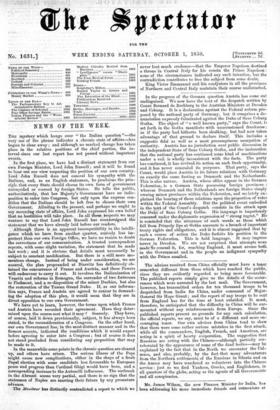NEWS OF THE WEEK. .
T/11: mystery which hangs over " the Italian question "—the very use of the phrase indicates a chronic state of affairs—has begun to clear away ; and although no marked change has taken place in the relative positions of the chief parties, the in- terval since our last report has not passed without important events.
In the first place, we have had a distinct statement from our ()vim Foreign Minister, Lord John Russell ; and it will be found to bear out our view respecting the position of our own country. Lord 'John Russell does not conceal his sympathy with the Italians, and, as an English statesman, he proclaims the prin- ciple that every State should choose its own form of government unimpeded or coerced by foreign States. He tells the public, authoritatively, that her Majesty's.Government have no indis- position to enter into Congress, but only upon the express con- dition that the Italians should be left free to choose their own Government. Alluding to the present, and perhatik we Ought' to say menacing state of affairs, Lord John expressed his own belief that .no hostilities will-ts.ke place. In all theser, *eiiiiecti we may venture to say that Lord John Russell has. eomitersignisd the'
statement that we have already laid before our readers. •••
• Although there is an apparent incompatibility. in the intern-. v gence which we have from _anether _alley, scarcely less im-
,
portant than our own -Foreign Office, we ,have, no reason to doubt the correctness of our communication. A trusted Correspondent repeats, with some slight variation, the statement• that he Made- last week ; and it is obvious that details must necessarily be subject to constant modification. But_there is a still more mo- mentous change. Instead of being under consideration, we are assured, the plan propounded at Biarritz has definitively ob- tained the concurrence of France and Austria, and those Powers will endeavour to carry it out. It involves the Italianization of Venetia and reforms in Romagna, the surrender of two fortresses to Piedmont, and re-disposition of the minor Duchies, but also the restoration of the Ttiscan Grand Dake. If, as one informa- tion says, France'and Austria are -agreed to concur in demand- ing the adoption of this plan, it would seem that they are in direct opposition to our own Government.
We have yet to learn, however, the terms upon which France
and Austria have recorded their agreement.- Have they deter- mined upon the course cost what it may ? Scarcely. They have, of course, laid it down provisionally, subject, it has always been stated, to the reconsideration of a Oongress. On the other hand, our own Government has, in the most distinct manner and in the firmest accents, indicated the conditions which it would expect before agreeing to enter, into a Congress ; but of course it *does not stand precluded from ' considering any proposition that may be made to it.
In the meanwhile some points in the chronic question are cleared up, and others have arisen. The serious illness of the Pope might cause new complications, either in the shape of a fresh Papal election with some candidate less favourable to European peace and progress than Cardinal Ghigi would have been, and a corresponding increase to the Antonelli influences. The outbreak in the Abruzzi seems very partial, and there is no sign that the statesmen of Naples are marring their future by any premature advance.
The Ifoniteur has distinctly contradicted a report to which we
never lent much credence—that the Emperor Napoleon destined a throne in Central Italy for his cousin the Prince Napoleon : none of the circumstances indicated any such intention, but the contradiction contributes to free the subject from some doubt.
King Victor Emmanuel and his coadjutors in all the provinces of Northern and Central Italy maintain their course undisturbed.


























